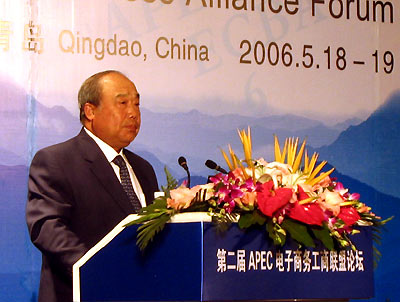| Tools: Save | Print | E-mail | Most Read |
| Seeking Solutions for the Application of E-commerce |
| Adjust font size: |
The second APEC E-Commerce Business Alliance Forum was held in Qingdao, Shandong Province Thursday. Co-sponsored by Asia-Pacific Economic Cooperation (APEC) and the Ministry of Commerce of China, more than 300 guests from governments, business and academia of all 21 APEC member states attended the two-day forum to seek solutions to E-commerce application in enterprises. Ambassador Tran Trong Toan, executive director of APEC's Secretariat, Jesus Orta, chairperson of APEC E-Commerce Steering Group, and Shi Guangsheng, vice chairman of the Financial & Economic Committee of the National People's Congress attended the forum and delivered speeches at the opening ceremony. Well known business personalities such as Graham Napier, president & CEO of TradeBeam, Inc. and Dr. Michael Dixon, managing partner of Public Sector of Asia Pacific Region in IBM Global Business Services delivered keynote speeches. With the theme, "Optimize Environment, Enhance Cooperation, Encourage Innovation, Promote Application", the Forum presented a valuable opportunity for people to share information, experiences and views on key areas of e-commerce including public service environment building, e-commerce application in enterprises and its development, enterprises and e-commerce third party services. Topics of discussion at the forum ranged from development strategy on promoting modernization of the economy through e-commerce to effective integration of service resources, information sharing and business coordination. It was highlighted that international e-commerce development should focus on its application in enterprises, adopt a low-cost, quick return strategy and close the "digital divide" between developed and developing economies within APEC. The way forward agreed at the forum will be submitted to this year's APEC Ministerial Conference to be held in Vietnam as an important basis for policy making of member state governments. E-commerce has significant potential in helping expand business opportunities, reducing costs, increasing efficiency and allowing for the greater participation of small businesses in global trade. Representing 98 percent of all enterprises in the APEC region and providing over 60 percent of private sector employment, small and medium sized enterprises (SMEs) have become a focus for APEC to promote the application of e-commerce. Over 25 projects have been initiated with a view to improving the environment for smaller enterprises to use e-commerce. A Reference Framework for Action on Electronic Commerce has been adopted with a guide encouraging the use of e-commerce among SMEs in all member economies. Established in October 2001, APEC E-Commerce Business Alliance aims at providing a link between the public and private sectors in e-commerce, close the gaps of APEC economies on the application level of e-commerce and to promote the development of electronic business. The APEC E-Commerce Business Alliance Forum is held every two years and holds in-depth talks on hot and key e-commerce issues in an effort to accelerate the overall development of e-commerce in Asia-Pacific region.
(China.org.cn staff reporter Li Shen, May 19, 2006) |
| Tools: Save | Print | E-mail | Most Read |
 |
| Related Stories |
|
| Product Directory China Search |
Country Search Hot Buys |
